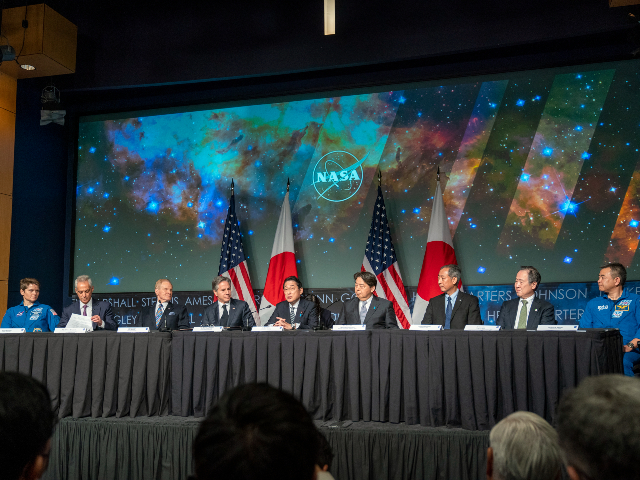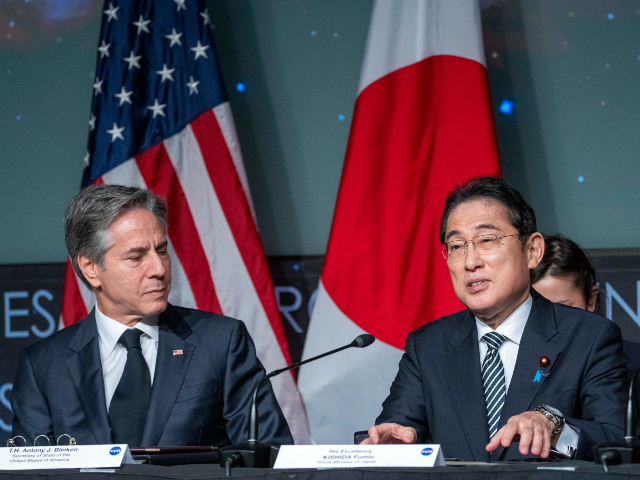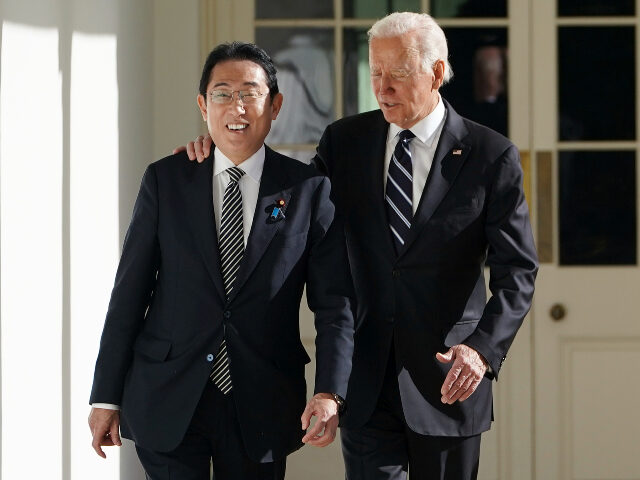The Chinese state propaganda newspaper Global Times published an editorial on Sunday threatening Japan with the same fate as Ukraine – a nation currently under siege and occupation by its much larger neighbor – in response to Prime Minister Kishida Fumio expressing concerns over Chinese military belligerence.
Kishida spent much of the past week attempting to shore up support for Japan’s national security from G7 member countries, including a stop in Washington to discuss both the Ukraine war and the threat of China with left-wing President Joe Biden. Kishida, a conservative, has for years promoted the development of a more advanced Japanese Self-Defense Forces – Japan does not have a formal military as a result of its behavior in World War II – and recently spearheaded the approval of the biggest military budget in recent Japanese history.
Japan currently holds the presidency of the G7, a coalition of seven of the world’s largest economies excluding Russia and China.
The Global Times, which serves as a mouthpiece for Beijing, warned that Japan itself was “turning itself into the ‘Ukraine of Asia'” by maintaining ties to Washington and pursuing its national security interests.
“If it continues to act as a pawn of the US in the Asia-Pacific region to stir up trouble here, Japan must be wary of becoming a victim itself of the US or even the Ukraine of East Asia,” the Global Times editorial board predicted. While the article cited Kishida’s remark that “Ukraine may be the East Asia of tomorrow” – which did not appear to be an expression of concern regarding an invasion of Japan itself – it reworked the phrase to directly threaten Japan.
Citing a regime-approved “expert” named Lian Degui, the state newspaper claimed that, “by stating ‘East Asia is the Ukraine of tomorrow,’ what Japan and the US mean is that they will hinder China’s reunification [with Taiwan].” Taiwan has never in its history been governed by a regime headquartered in Beijing, so technically it cannot be “reunified” with the current Chinese government.
“They want to put China in a dilemma where it has to use force, then shift the responsibility to the Chinese mainland and blame it for launching a war,” Lian predicted.
“If it continues to act as a pawn of the US in the Asia-Pacific region, Japan must be wary of becoming a victim of the US or even the Ukraine of East Asia,” the Times claimed.

Astronaut Ann McClain, U.S Ambassador to Japan Rahm Emanuel, NASA Administrator Bill Nelson, Secretary of State Antony Blinken, Japanese Prime Minister Fumio Kishida, Japanese Foreign Minister Hayashi Yoshimasa, JAXA president Yamakawa Hiroshi, Ambassador Tomita Koji, and astronaut Hoshide Akihito speak before signing an agreement on space cooperation at NASA headquarters, Friday, Jan. 13, 2023, in Washington. (AP Photo/Alex Brandon)
Prior to his meeting with Biden, Kishida warned, “Ukraine may be the East Asia of tomorrow,” an apparent reference to the persistent threat that China will invade Taiwan at any time. Taiwan is a sovereign, democratic nation that the Communist Party of China insists, falsely, is a rogue province belonging under Beijing’s rule. Chinese dictator Xi Jinping warned in 2019 that anyone supporting the reality of Taiwan’s independence would have their “bones ground to powder.”
“The situation around Japan is becoming increasingly severe with attempts to unilaterally change the status quo by force in the East China Sea and South China Sea and the activation of North Korea’s nuclear and missile activities,” Kishida said in remarks in Washington on Saturday. “Ukraine may be the East Asia of tomorrow.”
Russia invaded Ukraine in 2014, colonizing its Crimean peninsula and backing anti-Kyiv separatists in the eastern Donbass region for years with little international concern. Last year, Russian leader Vladimir Putin announced a “special operation” expanding the invasion into the capital and other previously unaffected areas, resulting in the Biden administration and Western Europe prioritizing intervention on Ukraine’s behalf. In September, Putin announced the “annexation” of the entire Donbass and two other regions, Kherson and Zaporizhzhia, raising alarms that he intended to conquer the entire country.
In a separate appearance at Johns Hopkins University, Kishida urged the world to pressure China into restraining itself from invasions or other violent actions.
“China needs to make a strategic decision that it will abide by the established international rules and that it cannot and will not change the international order in ways that are contrary to these rules,” the Hong Kong-based South China Morning Post quoted Kishida as saying.
Kishida also used the event to predict that his government’s efforts to strengthen Japan’s defense, part of longstanding Liberal Democratic Party (LDP) policy under slain former leader Abe Shinzo, would “one of the most historically critical milestones for strengthening the alliance” between Washington and Tokyo. Prior to his assassination last year, Abe had dedicated much of his public advocacy to defending Ukraine, stating the Russian invasion could precede a Chinese attack on Taiwan, which would be a Japanese “emergency.”

Secretary of State Antony Blinken, left, listens as Japanese Prime Minister Fumio Kishida speaks during an event to sign an agreement on space cooperation at NASA headquarters, Friday, Jan. 13, 2023, in Washington. (AP Photo/Alex Brandon)
Kishida unveiled a proposed five-year spending plan for its self-defense forces last month that would invest $320 billion into de facto military spending, a sum he called a “turning point in history” for the country.
The Times‘ threats were significantly more elevated than the remarks issued by the Chinese Foreign Ministry regarding Kishida’s remarks and his pursuit of a more robust Japanese force. The Foreign Ministry focused less on Kishida’s Ukraine comment and more on Biden lending Kishida support for his prodigious investment in the Japanese self-defense forces.
“President Biden commended Japan’s bold leadership in fundamentally reinforcing its defense capabilities and strengthening diplomatic efforts, as illustrated in the new National Security Strategy, National Defense Strategy and Defense Buildup Program,” a formal joint statement published by Kishida and Biden read on Saturday. “This investment will bolster security across the Indo-Pacific and beyond and modernize the U.S.-Japan relationship for the 21st century.”
In the statement, Biden “reiterated the unwavering commitment of the United States to the defense of Japan under Article V of the Treaty of Mutual Cooperation and Security, using its full range of capabilities, including nuclear” – essentially warning that the American military would act to defend Japan if attacked. Biden also “reaffirmed that Article V applies to the Senkaku Islands,” a direct message to China. The Senkakus are a small group of uninhabited but resource-rich islands in the East China Sea that China illegally claims for itself under the name “Diaoyu.”
The statement also urged Russia not to use nuclear weapons in Ukraine, which prompted former Russian President Dmitry Medvedev to urge Kishida to kill himself.
“The US-Japan joint statement contains manipulated and misleading narratives aimed at justifying military build-up by propagating and hyping up the so-called ‘nuclear threat from China,'” Chinese Foreign Ministry spokesman Wang Wenbin told reporters on Monday. “We firmly reject this and have made serious démarches.”
“Japan, as a non-nuclear-weapon state party to the Treaty on the Non-Proliferation of Nuclear Weapons (NPT), is supposed to fulfill its international obligations on non-proliferation,” Wang continued. “The reality, however, is that Japan has been sitting comfortably under the US’s “nuclear umbrella” and even opposing and obstructing efforts to get the US to relinquish its policy of first use of nuclear weapons.”
“We urge the US and Japan to abandon the Cold-War mentality and bloc confrontation, fulfill their nuclear disarmament and non-proliferation obligations in good faith, and step up to their role in upholding regional and international peace and stability,” he concluded.

COMMENTS
Please let us know if you're having issues with commenting.